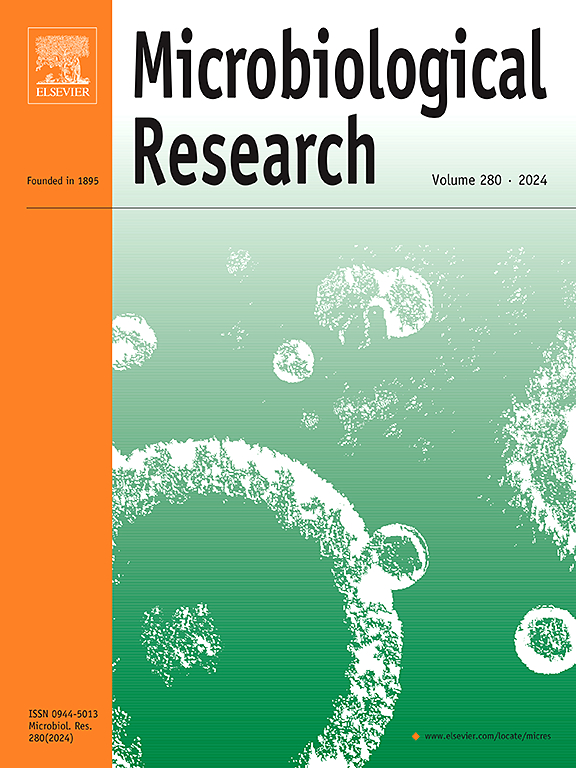五种 Rsm 蛋白在假单胞菌 Syringae pv. tomato DC3000 中的表达、调控和生理作用。
IF 6.9
1区 生物学
Q1 MICROBIOLOGY
引用次数: 0
摘要
属于 RsmA(次生代谢调节因子)/CsrA(碳储存调节因子)家族的蛋白质是小型 RNA 结合蛋白,在许多革兰氏阴性菌和一些革兰氏阳性菌中发挥着转录后调节基因表达的关键作用。虽然研究的大多数细菌只有一个 RsmA/CsrA 基因,但西红柿假单胞菌(Pseudomonas syringae pv. tomato,Pto)DC3000 编码五个 Rsm 蛋白:RsmA/CsrA2、RsmC/CsrA1、RsmD/CsrA4、RsmE/CsrA3 和 RsmH/CsrA5。本研究旨在全面分析这五个 rsm 蛋白编码基因的表达,阐明其表达的调控机制以及每个变体的生理相关性。为此,我们研究了 rsmA、rsmE、rsmC、rsmD 和 rsmH 在其遗传背景下的表达,确定了它们的启动子区域,并评估了它们的缺失和过表达对 Pto DC3000 各种表型的影响。一个新发现是,rsmA 和 rsmC 与上游基因组成一个操作子,而 rsmH 似乎与两个下游基因共转录。我们还观察到五个 rsm 准同源物之间在表达水平和 RpoS 依赖性方面存在很大差异。因此,尽管 Pto DC3000 中有大量 rsm 基因,但只有 rsmA、rsmE 和 rsmH 在所有测试条件(蜂群、最小和 T3SS 诱导液体培养基)下都有显著表达。其中,RsmE 和 RsmA 在功能水平上被证实为最重要的旁系亲属,而 RsmH 在调节自由生活和植物相关表型方面作用较小。相反,RsmC 和 RsmD 在测试条件下似乎不起作用。本文章由计算机程序翻译,如有差异,请以英文原文为准。
Expression, regulation and physiological roles of the five Rsm proteins in Pseudomonas syringae pv. tomato DC3000
Proteins belonging to the RsmA (regulator of secondary metabolism)/CsrA (carbon storage regulator) family are small RNA-binding proteins that play crucial roles post-transcriptionally regulating gene expression in many Gram-negative and some Gram-positive bacteria. Although most of the bacteria studied have a single RsmA/CsrA gene, Pseudomonas syringae pv. tomato (Pto) DC3000 encodes five Rsm proteins: RsmA/CsrA2, RsmC/CsrA1, RsmD/CsrA4, RsmE/CsrA3, and RsmH/CsrA5. This work aims to provide a comprehensive analysis of the expression of these five rsm protein-encoding genes, elucidate the regulatory mechanisms governing their expression, as well as the physiological relevance of each variant. To achieve this, we examined the expression of rsmA, rsmE, rsmC, rsmD, and rsmH within their genetic contexts, identified their promoter regions, and assessed the impact of both their deletion and overexpression on various Pto DC3000 phenotypes. A novel finding is that rsmA and rsmC are part of an operon with the upstream genes, whereas rsmH seems to be co-transcribed with two downstream genes. We also observed significant variability in expression levels and RpoS dependence among the five rsm paralogs. Thus, despite the extensive repertoire of rsm genes in Pto DC3000, only rsmA, rsmE and rsmH were significantly expressed under all tested conditions (swarming, minimal and T3SS-inducing liquid media). Among these, RsmE and RsmA were corroborated as the most important paralogs at the functional level, whereas RsmH played a minor role in regulating free life and plant-associated phenotypes. Conversely, RsmC and RsmD did not seem to be functional under the conditions tested.
求助全文
通过发布文献求助,成功后即可免费获取论文全文。
去求助
来源期刊

Microbiological research
生物-微生物学
CiteScore
10.90
自引率
6.00%
发文量
249
审稿时长
29 days
期刊介绍:
Microbiological Research is devoted to publishing reports on prokaryotic and eukaryotic microorganisms such as yeasts, fungi, bacteria, archaea, and protozoa. Research on interactions between pathogenic microorganisms and their environment or hosts are also covered.
 求助内容:
求助内容: 应助结果提醒方式:
应助结果提醒方式:


